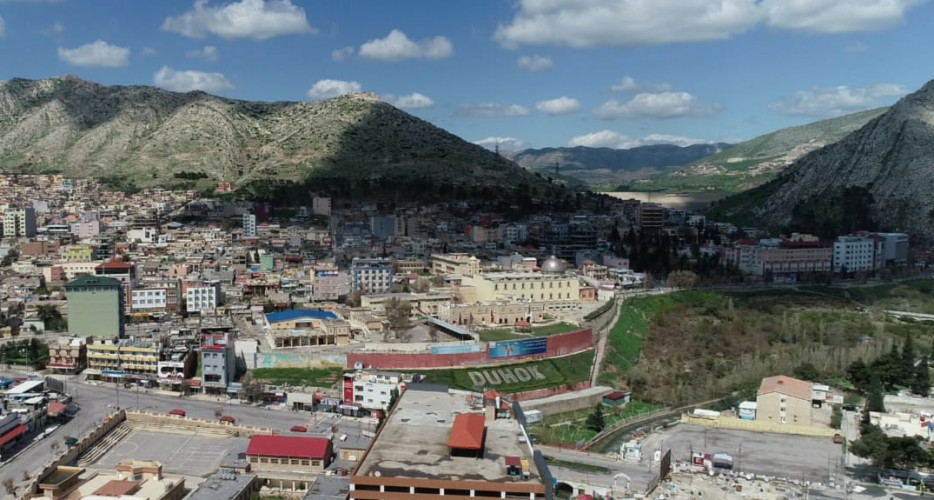
PEREGRAF
Fearful that the authorities will retaliate against them because of their work, journalists and activists in Badinan are deciding to leave their homes, either going to Sulaimaniyah, other parts of Iraq, or abroad.
According to follow-ups by PEREGRAF, this trend became apparent following the establishment of the current Kurdistan Region Government (KRG) cabinet under Prime Minister Masrour Barzani and accelerated last year during a general crackdown on critical voices.
A number of those who left still have arrest warrants out in their names and believe that they will be arrested if they return.
Named for the variety of Kurdish language spoken there, the Badinan area covers most of Duhok and Erbil governorates, which are controlled by the Kurdistan Democratic Party (KDP). It is also commonly referred to as the "yellow zone" in reference to the color favored by the KDP.
Originally from Akre in Duhok governorate, journalist Difaa’ Harki is one of those being sought by the authorities in Badinan.
"Because I have defended journalists on social media and to media agencies and have been against arresting them, my name was sent to the court in Erbil in order to obtain a statement from me," Harki told PEREGRAF.
"I have been threatened many times directly and indirectly and there have been many accusations against me. I left my home more than a month ago and came to Sulaimaniyah city to protect myself from being jailed and threatened," he continued.
"Many activists and journalists in Badinan, now and in past years, emigrated because of threats and refused to accept the harshness of politicians in Badinan."
The Badinan Region is one of the areas of the Kurdistan Region of Iraq which covers the cities of Amedi, Akre, Zakho, Shekhan, and Duhok. The Kurdish dialect of the people in this region, which is called Badini, differs from the rest of the Kurdistan Region, including Erbil and Sulaymaniyah, called Sorani.
The Metro Center for Journalists’ Rights and Advocacy say that it is aware of the state of affairs in Badinan and continues to monitor the situation.
Diari Haji Mhamed, Metro Center’s General Director, told PEREGRAF that in many cases the evidence used by the authorities to question and prosecute journalists "is not exact and does not prove anything."
"In addition to the ones who have been arrested and have arrest warrants, some other people have contacted Metro Center who in different ways have heard that their names are on arrest warrant lists. We have told them that all we can do for them at the moment is to get them a lawyer," said Mhamed.
He added that his organization is aware that some journalists and activists from Badinan have come to the "green zone," a term for the part of the Kurdistan Region under the control of the Patriotic Union of Kurdistan (PUK).
Asked how many journalists have left Badinan, he said that "some do not want their names to be published, so we will not give a number."
Back in Duhok governorate, all the main levers of political power and control of the security forces are in the hands of the KDP and have been for years. As a result, many criticisms of the situation there are directed at the party.
Akram Kully, a journalist from the governorate’s Zakho district, told PEREGRAF that the reason many of the journalists and activists from his area are deciding to leave is "because of the reduction in freedom and direct and indirect threats by the authorities."
"The ruling party in Badinan has published a policy against activists and journalists, anyone who speaks out on social medias or to media agencies will face legal action in different ways without caring about the laws of journalism or the rights of individuals, activists, and journalists," Kully said.
None of the journalists who were arrested in Badinan have been arrested under the Kurdistan Region’s Press Law, but are instead charged under the Iraqi Penal Code, which often comes with harsh punishments.
"They use the law in their own favor. Even now, arresting and summoning journalists for questioning in Badinan continues. Day-by-day the issue grows bigger," he added.
Although always present, the crackdown on critical voices intensified following a protest near Zakho on August 19, which started peacefully but quickly devolved into violence.
After that protest, dozens of journalists, activists, and ordinary residents were arrested, most on the pretext of "disrupting safety and security," even if they were not present at the demonstration.
Five journalists and activists who were arrested in the autumn were subsequently sentenced to six years in prison for violating a national security statute, although they deny the charges and will appeal.
Disputing the descriptions offered by the other interviewees, Deputy Governor of Duhok Majid Sayid Salih told PEREGRAF that journalists and activists are fully free to work and organize in Badinan, even if they are not members of the KDP.
"As officials, we do not see any differences in anyone, but if someone under the name of activism or journalism tries to agitate and make issues for life and peace in Duhok, then it is without a doubt our job to maintain safety. Otherwise, we do not want to arrest anyone or keep children away from their fathers," Salih said.
He further insisted that "everyone is free as long as they do not take rights from people and do not cause disruption."
The situation is similar across the Kurdistan Region, with activists and journalists under pressure in Erbil, Sulaimaniyah, and Halabja as well, but the problem is particularly grave in the "yellow zone."
Increasingly, international human rights groups are taking notice of the deteriorating rights situation in Badinan and continuously urge the authorities to improve.
For years, the Kurdistan Region has been proud to say that its human rights record is better from the rest of Iraq and neighboring countries like Iran, Turkey, and Syria, but this situation is now going in the wrong direction, with journalists and activists in serious danger.